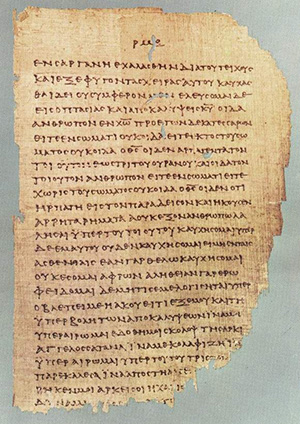Seventh in a series
I teach several philosophy courses at St. John’s University in which I spend a number of classes on the topic of truth. At the start of my first presentation, I stress that what we will read and discuss about truth is one of the most important sections of the course. I believe that what I teach about the meaning of truth is true and I challenge the students to prove me wrong. The students are encouraged to come up with some questions that my philosophy of truth cannot handle. I tell them to come up with as many questions about the meaning of truth that they can.
For example: What is truth? Is there any absolute truth? Can truth become error? Can error become truth? Is truth eternal? Is all truth human? Can we know a truth about God? Is truth about God human truth? I am hoping that students deal with this part of the course very seriously because I think that many of our contemporaries have given up any hope of ever discovering truth. I hope that what I teach about the nature of truth the students will find helpful in their other courses.

In his Broken Signposts: How Christianity Makes Sense of the World (New York HarperOne, 2020, pp. 198, $27.99) N.T. Wright identifies truth as one of seven signposts that both individuals and cultures seek but that is “broken,” and he suggests that it can be healed by accepting the vision of God and the human person in St. John’s gospel. Early in his chapter on truth Wright proclaims:
“The Christian gospel, however, offers a deeper approach to truth than the world is able to provide. In a world where it is suggested that truth itself is an illusion- where truth itself seems like a broken signpost, leading us around in self-defeating circles — the followers of Jesus ought to respond that to proclaim the absence of truth is itself a lie. There is such a thing as truth, even if it’s more elusive and strange than we sometimes imagine. What’s more, it is the truth that will set us free — free to live as new creations and free to become truth-tellers in our own right.” (pp.140-141)
Truth frees us and liberates us; error does not. Scientific truths free us as we try to understand the material world and live in it in ways that are beneficial to us. Truths about history offer us opportunities to avoid errors that were made in the past. Truths in great literature can help us to understand ourselves better and so live more wisely. Religious truth can free us in the most important ways. Religious truth can reveal the most important truths about ourselves, about our neighbors, and about God. Wright argues that the truths in St. John’s gospel are magnificent and should enable us to appreciate how much we are loved by God and what liberating actions God has done for us and is doing for us. Jesus tells his apostles that he is the way and the truth and the life. Wright insists that Jesus is proclaiming the arrival of a new creation. He writes the following:
“Truth here is the strange, gentle yet also powerful truth of new creation, the new creation that fulfills the old by taking the shame and death of the old into itself and overcoming it. Truth is the reality of love, divine love, Jesus’ love, the Love made flesh.” (p. 143)
Jesus’ death, and resurrection, changes everything by fulfilling the hopes and dreams of the Jewish prophets and teachers in the Old Testament, and the fulfillment goes beyond any hope and dream. If we accept the vision of Jesus and creation that St. John presents then we should become truth-tellers, trying however we can to spread the Good News, especially by revealing how we have been freed by the truth that is Jesus. We should try to live in such a way that our lives would make no sense if Jesus had not conquered death. That he has conquered death has freed us to live the Good News. Our culture seems to have forgotten or denied the truth that Jesus has conquered death. The following is a succinct statement from Wright stressing how the truth in John’s gospel, the truth that is Jesus himself, can liberate in ways that no other truth can:
“But the fact that the kingdom comes from somewhere else — from God himself, obviously — rather than being created from within the present world, speaks powerfully of what this truth really is and how it comes into being. John has been telling us throughout his gospel that the Creator, the God of Abraham, to whom Jesus bears witness and whom he claims even in some strange sense even to embody, is the God of love.
Creation itself was made through love and will be remade through love. It is love that washes the disciples’ feet. It is love that invites them to share the intimacy of relation that exists even between the Father and the Son. It is love that goes to the cross.” (pp.149-150)
Father Lauder is a philosophy professor at St. John’s University, Jamaica. He presents two 15-minute talks from his lecture series on the Catholic Novel, 10:30 a.m. Monday through Friday on NET-TV.
